Drug Addiction
Ocean Recovery offer Drug Addiction Treatment for those suffering with Drug Addictions here at our Blackpool facility. Request a Callback
By John Gillen - Last Updated: December 22, 2023
Clinically Reviewed on December 22, 2023 by Dr Robert Lutaaya. All information on this page has been reviewed and verified by a certified addiction professional.

Drug addiction is either physical or psychological in nature. Contrary to popular opinion, not all drug addictions relate to illicit drugs. In fact, far more people become addicted to prescription drugs that were initially taken to combat a physical or mental ailment.
Both illegal and prescription drugs are highly addictive and dangerous to health. Examples of addictive illegal drugs include cocaine, cannabis, crack cocaine and heroin.
Examples of addictive prescription drugs include oxycodone, benzodiazepines and the so-called ‘z’ drugs such as zopiclone and zolpidem. These prescription drugs are controlled, and it is illegal to consume them without a valid prescription.
The reason why people become addicted to drugs varies enormously between individuals. We discuss these reasons throughout this website, and we offer workshops and therapy sessions to help our clients better understand their own unique reasons for abusing illicit or prescription drugs.
- Facts and Stats About Drug Addiction:
- What is Meant by Drug Addiction?
- What Are the Signs that May Signify I Am Suffering from Drug Addiction?
- What Are the Reasons for Developing an Addiction to Drugs?
- How Do I Overcome Drug Addiction?
- Our Rehab Facilities
- Images of Our Facilities
- Facilities at Ocean Recovery
- Give Us A Call
- Areas We Cover
When someone has a drug addiction, it is considered that the best approach is to seek out drug addiction treatment at a residential facility. This is exactly what we offer at Ocean Recovery Centre in Blackpool, Lancashire, and nationally throughout the United Kingdom through our parent company, Step One Recovery.
Undergoing Drug Addiction Treatment such as Drug Rehab at our Ocean Recovery Centre allows you to detox under medically controlled conditions.
You will also benefit from a robust therapy and counselling service that help you to readjust to life without drugs. Here, you will gain the tool-set needed to remain in recovery for the rest of your life.
Contact Us
94 Queen's Promenade, Blackpool, FY2 9NS, Blackpool, FY2 9NS
Landline: 01253 847 553
Email: info@oceanrecoverycentre.com
Start your Recovery - Call us nowFacts and Stats About Drug Addiction:
A report published by the NHS in February 2018 highlights some worrying statistics about drug misuse in England and Wales. See below list of highlights from the report.
- In 2016/17 there was 7,545 drug-related hospital admissions of which 74% were male.
- 8.5% of adults aged 16-59 took an illicit drug last year.
- There was a peak in admissions for 25 34 year olds who made up 33% of the total admissions.
- The research shows that Liverpool was the city that reported the highest number of drug misuse admissions with the North West having the highest rate of admissions for males and North East for females.
- The number of patients diagnosed with illicit drug poisoning was 14,053 with Blackpool being the most affected.
- There were 2,593 drug-related deaths in 2016 which is a 5% increase on 2015 and the highest reported number since records began.
- 279,793 people came into contact with drug and alcohol-related services in the year 2016/17 with opiates being the most commonly treated for substance abuse.
What is Meant by Drug Addiction?
The word ‘drug addiction’ is a common term. You will have come across the term in films, TV programmes and during your school years. However, the exact definition of drug addiction is often misunderstood.
So what exactly is drug addiction? Essentially, drug addiction is either psychological or physical and psychological in nature.
Generally, you cannot be physically addicted to a drug without being psychologically addicted too, whilst it is possible to be psychologically addicted without being physically addicted.
If you become physically addicted to a drug, you will experience physical withdrawal symptoms when you attempt to detox. Examples of physically addicted drugs include alcohol and heroin. Examples of drugs that are merely psychologically addictive include cocaine and cannabis.
The public is generally unsympathetic to people who develop a drug addiction. Surveys conducted by researchers and media publications prove this fact.
Many assume those who develop an addiction to drugs are someway culpable for their addiction. Others assume drug addiction is merely a lifestyle choice.
These popular opinions are widely denounced by the wider medical community. For many years now, medical experts equate drug addiction to an illness that’s largely devoid of moral responsibility on the sufferer’s behalf and according to the national institute on drug abuse, addiction is a chronic disease that shows
At Ocean Recovery Centre, we reject popular opinion by agreeing with the medical community that drug addiction is indeed a disease of the mind. This view of drug addiction permeates everything we do.
When you attend Ocean Recovery’s core drug addiction treatment programme, you will benefit from a wide range of therapy techniques that allow you to combat the disease of addiction and thus live a long and happy life.
What Are the Signs that May Signify I Am Suffering from Drug Addiction?
If you are concerned you or a loved one could be suffering from a drug addiction, you will undoubtedly benefit from knowing the classic signs.
The term ‘drug addiction’ is a general term, and the signs of drug addiction vary between different people and different drugs.
Here, we shall list some of the signs that are common amongst all drugs. You will thus need to conduct additional research in discovering the signs of the specific drugs you or your loved one is addicted to.
Some of the classic symptoms that appear for all drug addictions include:
- Your sleeping pattern is negatively affected by your drug use
- Your education or work has been negatively affected by your drug use
- You conceal your drug use from your loved ones
- Your mood is affected by your drug use to the point that it is raising concern amongst your loved ones
- You have given up interests and hobbies in order to spend more time taking drugs
- You experience a number of physical changes such as dramatic weight loss due to your drug use
What Are the Reasons for Developing an Addiction to Drugs?
The reasons why you may develop an addiction to drugs are many, and modern researchers have failed to pin down one definitive set of causes.
Most researchers agree that drug addiction arises due to environmental factors and genetic characteristics, according to the national institute on drug abuse, addiction is a chronic disease similar to type II diabetes, cancer, and cardiovascular disease.
You are also more likely to develop an addiction to drugs if you suffer from a physical or sexual traumatic experience during your childhood.
But it can also come down to the people you surround yourself with as many drug addicts admit that peer pressure was the reason they first started using drugs.
You are also more likely to develop an addiction to drugs if you suffer from a common mental health ailment.
This is because people who suffer from mental health ailments are known to ‘self-medicate’ the symptoms of these underlying illnesses with illicit or prescription drugs.
Examples of these ailments include anxiety, depression, schizophrenia, Post Traumatic Stress Disorder (PTSD) and an eating disorder.
How Do I Overcome Drug Addiction?
The most effective way to overcome drug addiction is to attend an inpatient drug treatment clinic where drug addiction treatment options such as drug rehab and drug detox programmes can be undertaken.
Here, you will be detoxed safely off your drug of choice in a controlled manner. You will then benefit from therapies that address the mental aspect of drug addiction.
The process of long term recovery from addiction can be a tough one but with the right rehabilitation programme like the one we offer at Ocean Recovery, you can start believing that a life without drug use is truly possible.
All our treatment programmes come with a free 12-month aftercare plan which ensures that you’re receiving the support needed even after you have left our treatment centre.
We offer many drug addiction treatment options with residential drug rehab and detox programmes at our clinic in Blackpool, Lancashire.
For a free telephone assessment, contact us today, or alternatively, submit an enquiry through this website.
Our Rehab Facilities
At Ocean Recovery, we are extremely proud of our state-of-the-art facility. We provide residents with the most relaxing stay possible and they can enjoy our modern establishment.
Ocean Recovery Facilities include:
CQC Registered
FREE Transportation Included
Medically Assisted Detoxification
2 Executive, Sea View Double Ensuite Rooms
8 Double or Single Ensuite Rooms
3 Single Rooms with Dedicated Separate Bathroom
Comfortable Communal Lounge with Piano & Sky TV
Beautiful Modern Dining Lounge
External Courtyard and Outside Seating Area
12 Months FREE Aftercare
Regular Contact with Loved Ones Encouraged
Large Multi-Purpose Group Activity Room with Superb Sea Views
Images of Our Facilities


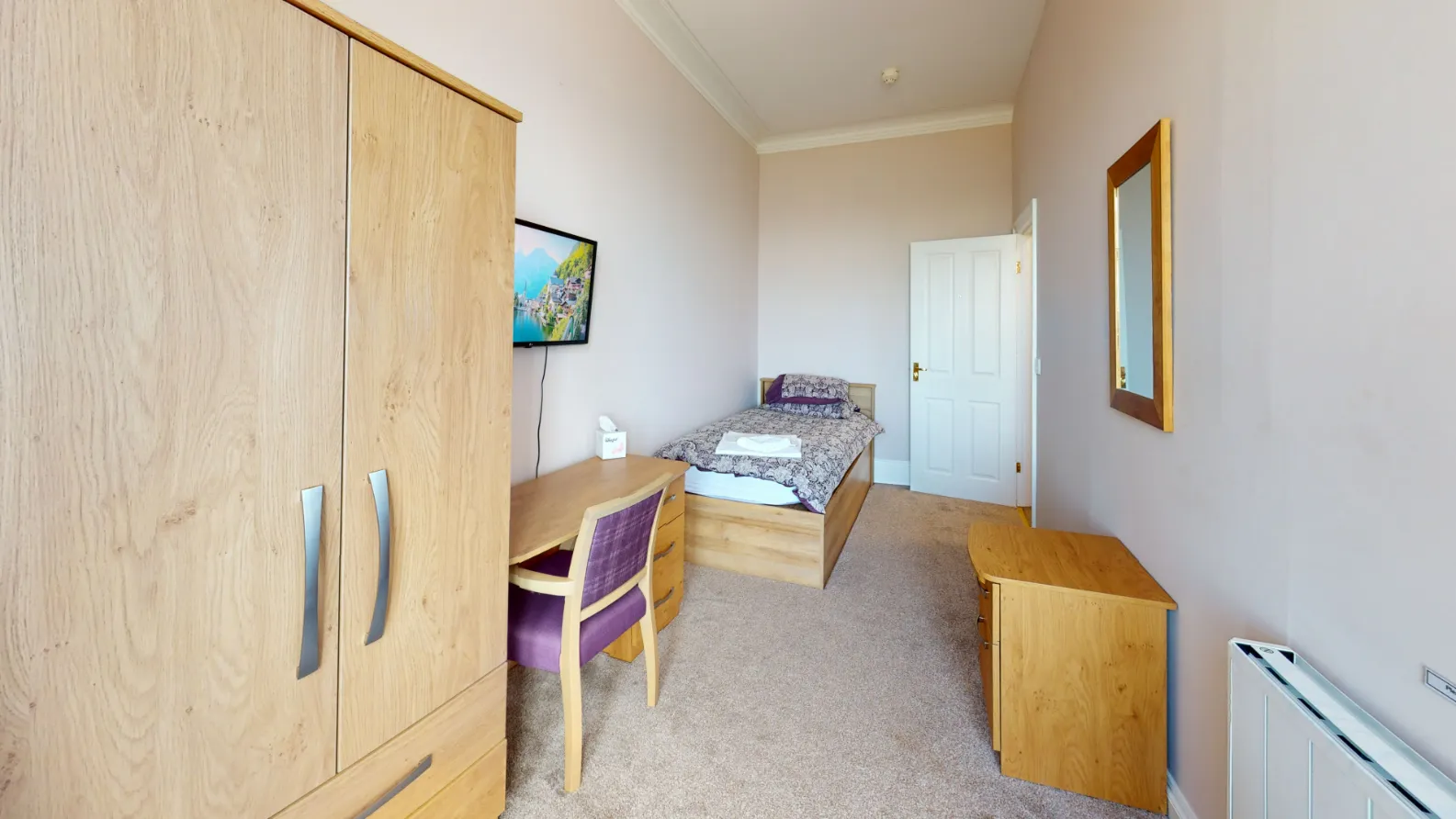
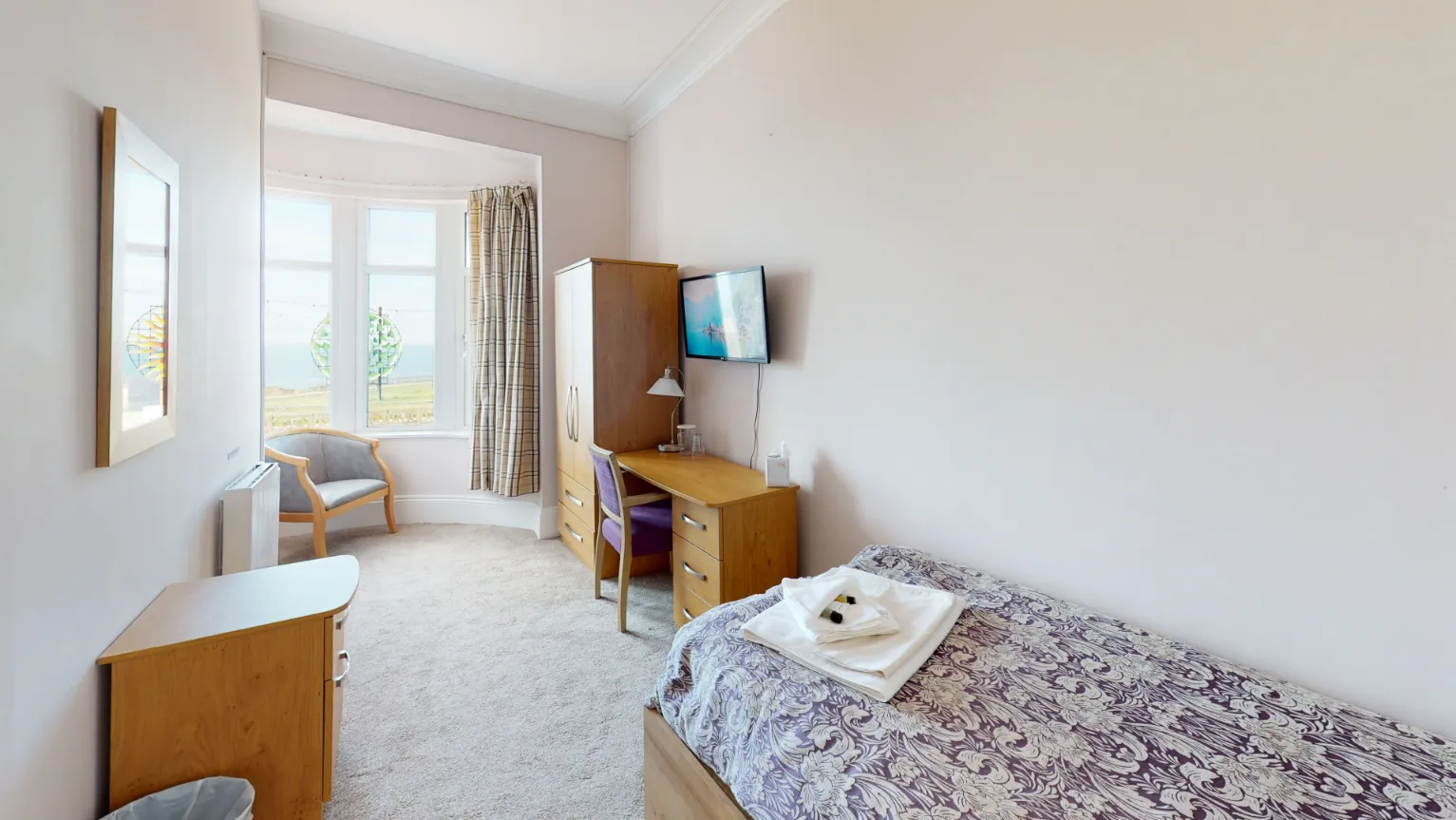
Facilities at Ocean Recovery









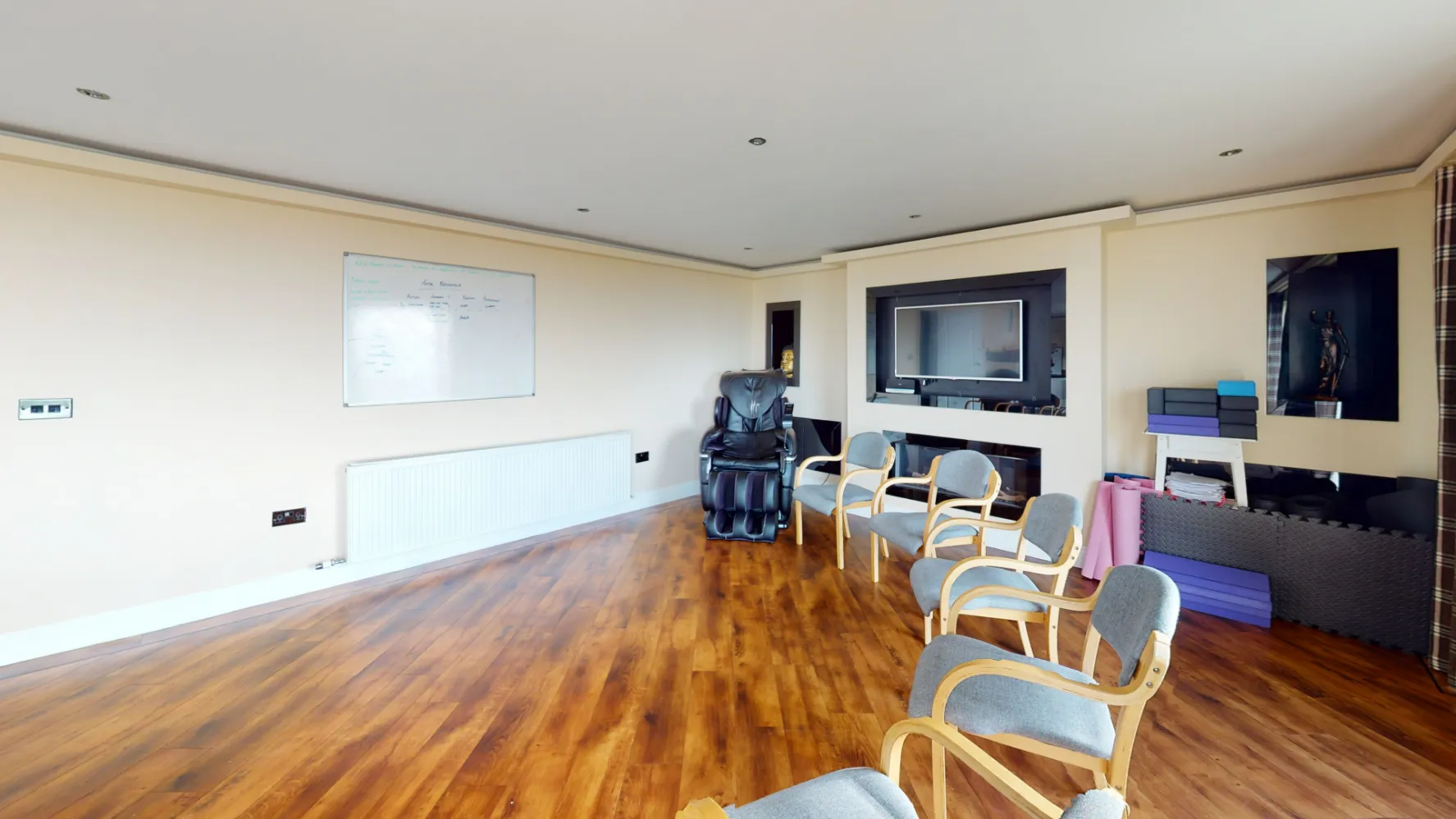
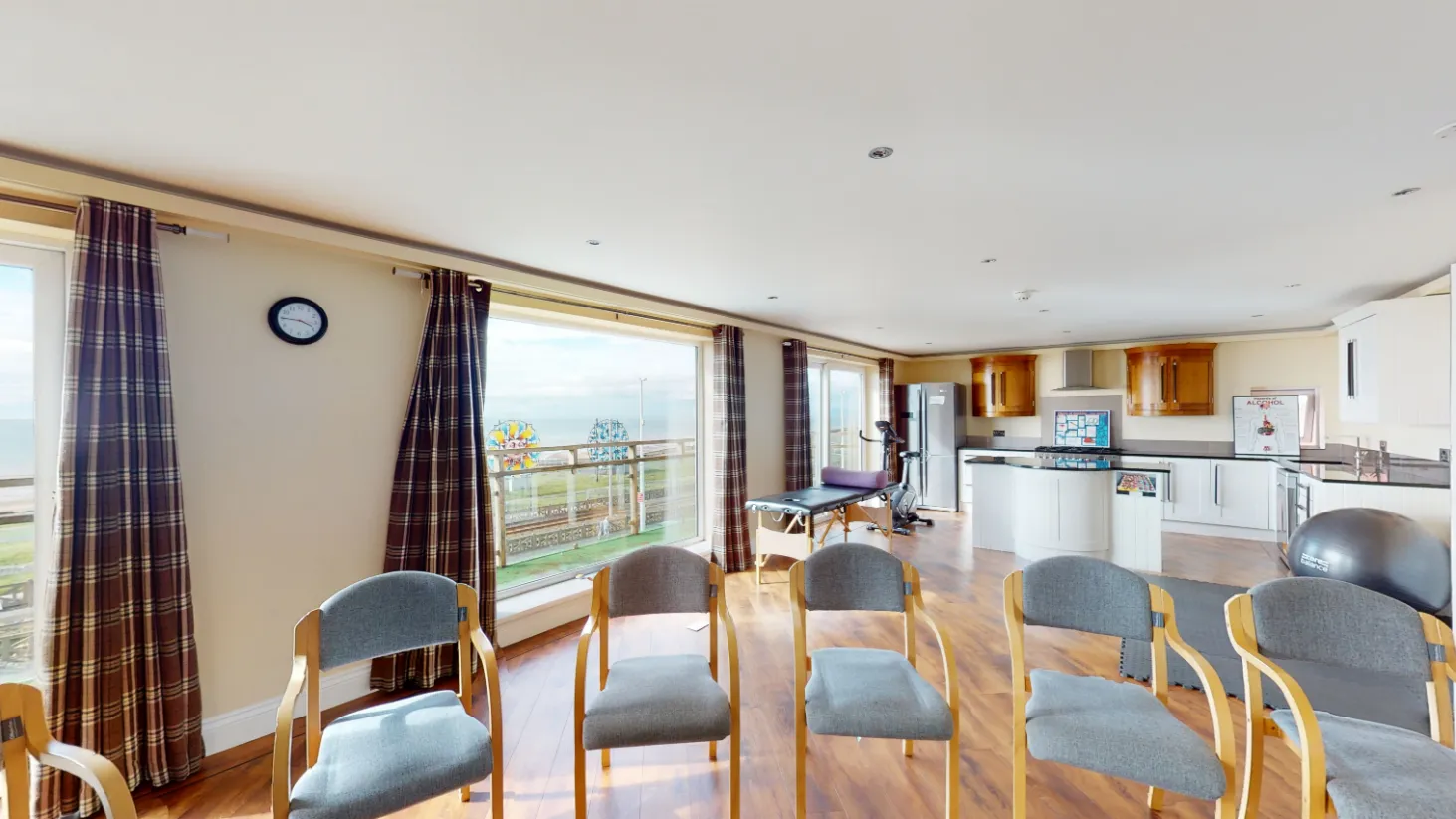
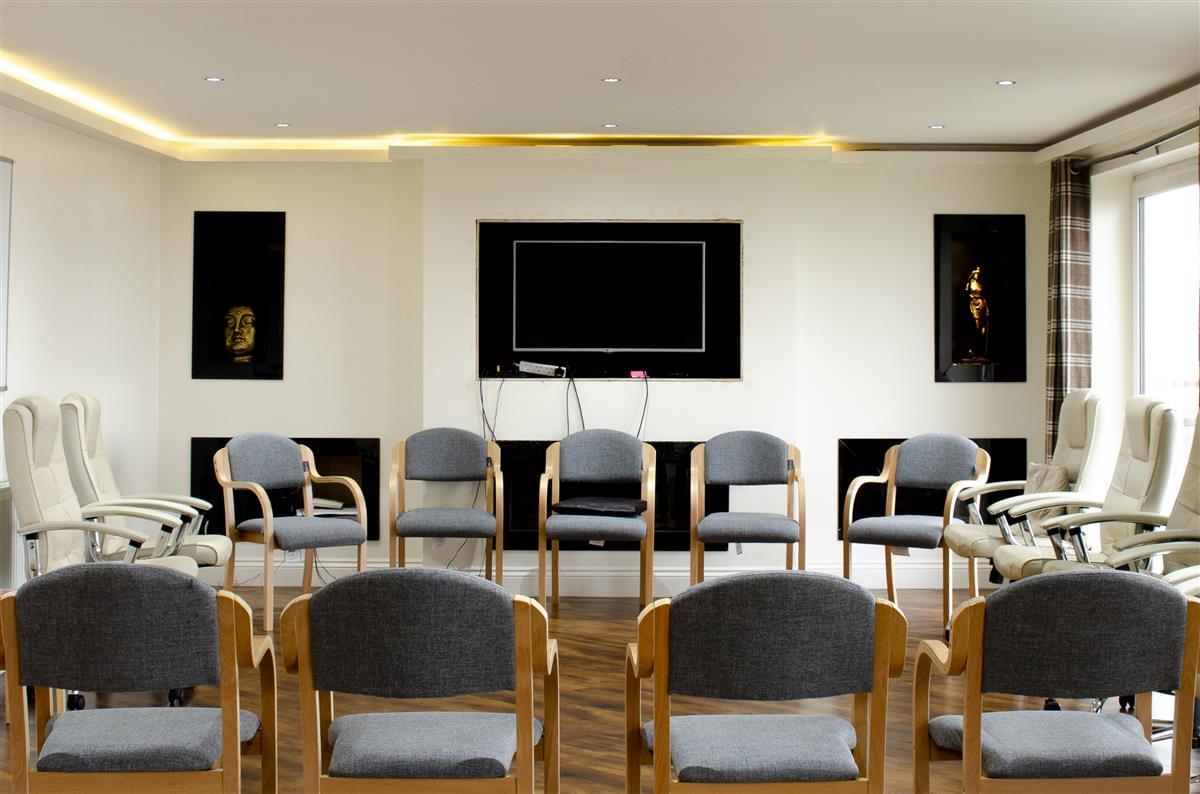


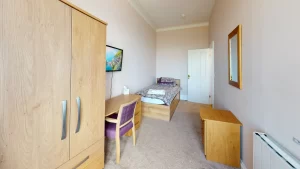






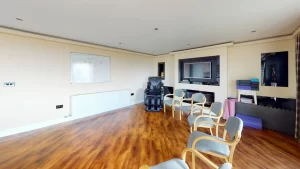


Give Us A Call
Speak to an advisor today to find out more about the rehabilitation programmes we offer at our drug and alcohol rehab centre
Areas We Cover
See below list of just some of the locations our leading alcohol rehab service covers in the United Kingdom.
- Rehab in Liverpool
- Rehab in Manchester
- Rehab in Birmingham
- Rehab in Nottingham
- Rehab in Glasgow
- Rehab in Cardiff
- Rehab in Bristol
- Rehab in Blackpool
- Rehab in Cumbria
- Rehab in Lancashire
- Rehab in Merseyside
- Rehab in Cheshire
- Rehab in Yorkshire
- Rehab in West Midlands
- Rehab in North East
- Rehab in Surrey
- Rehab in Essex
- Rehab in London
Frequently Asked Questions
Choosing the right rehab treatment provider can be a life-changing decision; here are some of the most common questions we are asked pre-admission.
I have a loved one who suffers from an addiction, what do I do?
Convincing a family member or loved one that they have an addiction and need help can be very difficult. This is why we offer intervention programmes which are designed to get family and friends together with their loved one and sit with a member of our team.
The hope is that with the help our team member who can provide all the information about addiction and the best way to treat it this will then convince your loved one to admit their wrongs and be more open to a discussion. Find out more about our intervention programme by clicking here.
What are the side effects/symptoms that come with a drug detox?
Depending on the severity of your substance use disorder we may prescribe you some prescription drugs if the symptoms you’re experiencing during your medical detox start to develop any signs of becoming severe. This is a rare occurrence as the majority of detoxifications are done without any serious withdrawal symptoms occurring.
Common side effects/symptoms include:
- Headaches
- Fatigue
- Mood Swings
- Anxiety
- Insomnia
- Constant Sweating
- Shakiness
- Loss of Appetite
- Muscle Aches
- Dizziness
- Increased Heart Rate
- Seizures
John Gillen
- Author
- Last updated: December 22, 2023
John is one UK’s leading professionals in the addiction recovery industry. Pioneering new treatment techniques such as NAD+ and ongoing research into new therapy techniques such as systematic laser therapy, John is committed to providing the very best treatment for people throughout the UK and Europe. During his extremely busy schedule, John likes to regularly update our blog section with the latest news and trends in the industry to keep visitors to our site as well informed as possible on everything related to addiction treatment.
Dr Robert Lutaaya
- Clinical Reviewer
- Last reviewed: December 22, 2023
MBChB, MSc Psych
Dr Robert Lutaaya qualified in 1995 from Worclaw Medical University as MBChB, and obtained a MSc Psych from the University of Manchester in 2014. Dr Lutaaya has previously worked for the CGL Substance Misuse Service and as an on-call doctor substance misuse Doctor for 17 years before joining Ocean Recovery. Dr Robert Lutaaya is committed to helping those struggling with alcohol and drug addictions.
Request A Callback
Enter your phone number and a member of our team will call you back to discuss your recovery.
"*" indicates required fields
Contact Us
For more information please get in touch using the information below
Call: 01253 847 553 Send us a messageDownload Our Brochure
For more information about the addiction services that Ocean Recovery offer, download our brochure.
Download our brochureDo I need help?
A lot of people are unsure if there are suffering from addiction. Take these tests to find out if its effecting you without your knowledge.
Select your test and find out more
Drug Addiction Treatment
Drug Addiction Resources
Our Blogs
-

How Do I Know if I’m an Alcoholic?
For many people, drinking is a normal part of social life. A glass of wine with dinner, a pint at the weekend, or a toast at a wedding. All seemingly harmless. But for some, drinking becomes more than just a way to unwind. It can slowly take over daily life, relationships, work, and mental health.
-

How Long Will Fentanyl Stay in Your System?
Heroin addiction is a continuing problem in society. America has, for many years, been in the grip of an opioid crisis, fuelled by the rise of fentanyl. Problems around opiates exist in the UK, with 2,551 deaths involving them, according to the latest figures. People can take fentanyl knowingly, or it is in drugs such
-

How Does Alcohol Affect Menopause?
Menopause is a normal part of ageing that all women have to deal with. Many changes happen during these years, and they can be difficult to deal with. If you are struggling with an alcohol addiction or drink casually and are worried about how alcohol affects menopause, you should educate yourself. Going through these changes
-

Are We Redefining What It Means to Have a Problem With Alcohol?
Since very recently, the understanding of alcohol use and its associated disorders has been up for debate. The traditional, binary view of individuals as either “alcoholics” or “non-alcoholics” is being challenged by a more nuanced perspective that recognises a spectrum of problematic alcohol use. This shift is a direct reflection of the varied experiences of
-

What is Carfentanil? Everything You Need to Know
Drug addiction is a continuing problem in the UK. In the latest ONS release, 5,448 drug-related deaths were recorded in England and Wales – which is a considerable increase from the previous year. Opioids are a big reason for these numbers. Excluding drug-related deaths where the substances involved are not mentioned, opioids are responsible for
-

What Are the Symptoms of Cocaine Cardiomyopathy?
Cocaine can have a number of risks, including the possibility of overdose and the risk of addiction. One issue you might not be familiar with is the risk of cocaine cardiomyopathy. What is Cocaine Cardiomyopathy? Cocaine is a potent stimulant associated with the development of numerous cardiovascular issues, including dysrhythmias (abnormal heartbeat) and hypertension (high
-

Understanding Hypoxemia: Causes Symptoms and Risks
Substance misuse can have a wide range of physical effects, depending on the substance involved and many other factors. One possible risk is hypoxemia, which affects how the body processes vital oxygen intake. But what Is hypoxemia, and what are the risk factors involved? What is Hypoxemia? Hypoxemia is a medical condition characterised by low
-

Why Addiction Changes Your Personality
Addiction creeps in, and it’s often quiet. But once it takes hold, it can reshape everything about who you are, your habits, your priorities, and even your personality. It’s not just about the substance or behaviour itself. Addiction can fundamentally alter the way you think, feel, and interact with the world. If you’re looking to
-

How the Winter Blues Can Impact Sobriety
Everything can seem a little darker during the winter. As the days shorten and the weather worsens, you may feel a little more down than normal. This is a common thing that many people experience and is known as the winter blues. The winter blues can be hard for anyone to cope with as it
-

How to Host a Recovering Addict at Christmas
Christmas is supposed to be a time of happiness and joy, but the traditional season of goodwill can also be challenging for a lot of people. For those struggling with bereavement, loneliness and a wide range of other situations, the Christmas period can be very difficult. People who are struggling with an addiction or are
